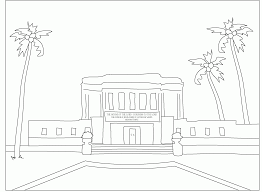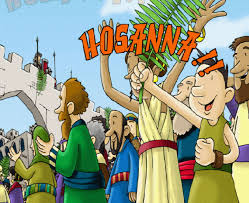Matthew 21:1 – Now when they drew near to Jerusalem and came to Bethphage, to the Mount of Olives, then Jesus sent two disciples.
Jesus and the twelve are heading to Jerusalem from Jericho, a distance of about 19 miles. Obviously, this took multiple days. What do you think they talked about while walking all those miles? I am sure they spoke of ordinary things like the weather, and current events. Maybe they joked a bit or sung some songs. In between, I am sure that Jesus shared spiritual wisdom and truth with them, and they had a chance to ask him questions.
On the surface, that sounds amazing – walking along with Jesus for a few hours, just fellowshipping and asking questions. You might be tempted to envy the disciples, but before you do, consider this: You actually have it better than the disciples, because Jesus is with you ALL of the time and you can speak to him at any moment!

So don't wait! Begin to speak to him right now, and develop a spiritual ear to hear him answer you!
Most of this 19 mile journey was either through desert or woods filled with caves and rocks. It was indeed a fit place for robbers to ambush people (Luke 10:30).
Let's talk about the Mount of Olives (or Olivet) for a moment. We find it mentioned a great deal in scripture. It is named for the obvious reason – an abundance of olive trees grew there. This place was located about a 'Sabbath day's journey' (2 miles) from Jerusalem (Acts 1:12). On the west side of this mountain was the Garden of Gethsemane (Luke 22:39). On the eastern side were the villages of Bethphage and Bethany.
What do you remember about Bethany?
The name means 'house of unripe figs'. It was the hometown of Lazarus, whom Jesus raised from the dead (John 11:1). Since Mary and Martha lived with their brother Lazarus, it was their home too. It was also the place where Mary anointed Jesus with the expensive oil of spikenard against the day of his death (John 12:1-7).
The Mount of Olives is about 700 feet high and overlooks the city of Jerusalem. From its summit, nearly the entire city of Jerusalem can be seen.
Now that we have an idea of their physical location, let's consider the social climate that Jesus and the 12 are walking into.
The religious leaders now openly despise Jesus. In fact, they are looking for a way to arrest him (John 11:57). Meanwhile, the masses of common people support Jesus. His popularity is at its all time high. They believe (incorrectly) that he will immediately set up a new kingdom, defeat the Romans and take power for himself. God is using the influence of the common people to keep Jesus safe from the religious leaders. The threat of their revolt is the only thing keeping the Pharisees in line (Matthew 21:26).
Now the great feast of Passover is imminent. Jews from all over the known world are flooding Jerusalem; the city is bursting with people. What do you suppose is on the minds and lips of all those Jews? Right – Jesus! Is he the Messiah? Will he soon take over Jerusalem? What about the Romans?
Speaking of the Romans, all of these additional people were a nightmare for them, because they were charged with keeping order in the city. And they were not a bit afraid to use the most violent and brutal tactics to keep the peace.

From man's perspective, Jerusalem seems like a powder keg that could blow up at any moment! No doubt Satan is there trying his best to light the fuse! He is rejoicing because he thinks he is on the verge of annihilating the Messiah.
But from God's perspective, everything is happening exactly according to his specifications and plans. Heaven is also rejoicing, because the salvation of man is about to be legally completed! The kingdom of the Messiah is coming to pass! Mankind will soon be reunited with the Father!
What about your life? Does your situation seem like a 'powder keg'? Things have changed drastically in the last few months, haven't they? Make sure you are looking at things from God's perspective. He is still on the throne. He is still watching over his word to perform it. You have not been lost in the shuffle of world events. God neither slumbers nor sleeps; he is keeping guard over you right now, just as he always has!
Matthew 21:2 – saying to them, "Go into the village in front of you, and immediately you will find a donkey tied, and a colt with her. Untie them and bring them to me."
Why did Jesus choose to ride on a donkey instead of a horse?
At that time, there were few horses in Jerusalem, and the ones that were present were chiefly used for war. Men seldom if ever used horses in common life. Instead, they used donkeys, mules and camels.
 To ride on a horse was an emblem of war. To ride on a donkey or mule was an emblem of peace. How interesting that during Jesus' first coming, he rides the donkey of peace, but during his second return to earth, he rides a horse of war (Revelation 19:11)!
To ride on a horse was an emblem of war. To ride on a donkey or mule was an emblem of peace. How interesting that during Jesus' first coming, he rides the donkey of peace, but during his second return to earth, he rides a horse of war (Revelation 19:11)!
Donkeys and mules were the mode of transportation used by kings and princes during times of peace. It was a mark of rank and dignity to ride in that manner (Judges 10:1-4, I Samuel 25:20). When King Solomon rode to his inauguration, he rode a mule (1 Kings 1:33), which was the appropriate way in which a king should ride. It was in no way a sign of poverty or degradation. Thus, it was fitting for Jesus to ride into Jerusalem on a donkey. When doing so, he was acknowledging himself as king to the world.
Matthew 21:3 – "If anyone says anything to you, you shall say, 'The Lord needs them,' and he will send them at once."
Jesus once again displays his divinity by knowing about the existence of the colt, its exact circumstance and location, as well as the response of the owners.
The disciples are not to rent this beast or to ask permission to borrow it. They were to claim the right to use it for the service of a King.
Matthew 21:4-5 – This took place to fulfill what was spoken by the prophet, saying, "Say to the daughter of Zion, 'Behold your king is coming to you, humble, and mounted on a donkey, on a colt, the foal of a beast of burden.'"
Now we see the exact reason why he rode into Jerusalem in the first place, instead of just walking there as he had done his whole life.
It was to fulfill an ancient prophesy, found in Zechariah 9:9. The Jews universally applied this prophesy to the Messiah and no other. This was a plain, straightforward, literal fulfillment of an ancient prophesy, and it clearly declared that Jesus was the Messiah.
Zechariah 9:9 - Rejoice greatly, O daughter of Zion; shout, O daughter of Jerusalem: behold, your King comes unto you: he is just, and having salvation; lowly, and riding upon a donkey, and upon a colt the foal of a donkey.
And yet, he was not the Messiah that they expected. His entrance into Jerusalem has been called the Triumphal Entry of Christ. But it was not a fleshly or earthly triumph. It was a triumph of humility over pride and ambition; a triumph of meekness and gentleness over rage and malice. Jesus comes full of kindness and compassion to deliver himself up to those who were plotting his destruction! The king enters the city to be cruelly abused and murdered by his own subjects, and to make his death a ransom for the souls of mankind!
Matthew 21:6 – The disciples went and did as Jesus had directed them.
I find this verse interesting for what it doesn't say. There is no mention of delay. The disciples responded immediately. There is no mention of discussion. They did exactly what Jesus asked them to do. There was no whining or complaining. They did not require a full and detailed explanation of the purpose behind the command.
Basically, they just did as Jesus asked them to do, and their endeavor met with success. What a great example for us!
Matthew 21:7 – They brought the donkey and the colt and put on them their cloaks, and he sat on them.
The scriptures are very specific that this colt had never before been ridden (Mark 11:2, Luke 19:30). Therefore, it would not have a saddle. So it makes sense that the disciples would take off their outer garments and put them on the colt as a kind of substitute for the saddle.
Whether they knew it or not, this action had a greater significance.
Back in 2 Kings 9, we find the story of Jehu being anointed as king. At the time, he was a commander in the army. Then one day, at the behest of Elisha (who was under direct orders from God), one of the prophets ran to find Jehu, called him into an inner room by himself, anointed him as king, then fled the scene. Immediately afterward, when his men found out what had happened, every man took his garment and spread it under Jehu at the top of the steps then blew the trumpets saying, "Jehu is king" (2 Kings 9:13).
So laying down your outer garment was the custom in ancient Israel whenever they found that God had anointed a man to be their king. And this was the exact thing that took place when Jesus was riding into Jerusalem on that colt!
Matthew 21:8 – Most of the crowd spread their cloaks on the road, and others cut branches from the trees and spread them on the road.
Although it was certainly not the intention of the disciples, the multitude followed their example by casting tree branches in the road before Jesus. This was the way in which ancient conquerors and princes were often honored. Casting flowers, garlands or evergreens before a warrior returning from victory or a king entering into his kingdom was a common way of expressing joy and triumph. (The famous historian Josephus says that King Agrippa was received this way as he entered into Jerusalem).

Interestingly, John 12:13 tells us that the tree branches were actually Palm branches. The palm was an emblem of joy and victory used and recognized by the Roman soldiers as well as the Jews. For both groups, it was an emblem of peace.
So we find the common, obscure multitudes revering Christ as King. God often uses the common or insignificant people of this world to do his bidding (1 Corinthians chapter 1). I don't know about you, but that is good news for me!
Some scholars feel that the Holy Spirit moved on the crowds and prompted them to do this. Others feel that the people did it believing that Jesus was going to rise to power and claim an earthly kingdom immediately after (if not during) the current Passover festival. Regardless, the group was clearly proclaiming Jesus Christ as the Messiah.
Matthew 21:9 – And the crowds that went before him and that followed him were shouting, "Hosanna to the Son of David! Blessed is he who comes in the name of the Lord! Hosanna in the highest!"
Let's examine the praise that the crowd now offers to Christ.
Hosanna: This word literally means 'save now' or 'save, we beseech thee'. The word was always spoken in an emphatic manner, with deep emotion behind it. It was used as a plea by the common people to have the king redress their grievances and give them relief from oppression (See 2 Samuel 14:4, 2 Kings 6:26 and especially Psalms 118:25. The 118th Psalm was used as a hymn in the celebration of the Passover meal and the Feast of Tabernacles).
In this instance, the Jews are literally asking Jesus to relive them from the oppression of their enemies. Although the Jews did not understand it at the time, Jesus will do that by granting them relief from their sins.
Son of David: This is a well known Jewish title used to mean Messiah. It was never given to prophets or other holy men of God. This was the term used by the blind men in Matthew 20.
Blessed is he who comes in the name of the Lord: To come in the name of the Lord means to come in God's authority; to be commissioned by God to reveal his will. This was another phrase the Jews used in connection with the Messiah.
Hosanna in the highest: This was essentially a prayer to the supreme God meaning 'Save now, you who dwell in the highest heaven'. They were asking for the utmost degree of salvation and deliverance to be granted to them.
By openly asserting his claim as Messiah (by riding the colt) and passively accepting the accolades of the Jews (the laying down of garments/branches and the praises), Jesus is accepting their acknowledgement of him as their King.
It is no coincidence that this revelation comes only days before his death. Had he revealed himself this way any sooner, the people would have taken him by force and tried to make him an earthly king.
Matthew 21:10-11 – And when he entered Jerusalem, the whole city was stirred up, saying, "Who is this?" And the crowds said, "This is the prophet Jesus, from Nazareth of Galilee."
His entry into Jerusalem was a great and unusual event. It was not something done in secret. The whole city was talking about it.
Therefore, all the religious leaders (Scribes, Pharisees and priests) could not have been ignorant of it. Their reaction to it revealed the pride and malice hidden in their hearts. They rejected Jesus as the Messiah, choosing to worship their religious rituals instead.
Then we have the devoted followers of Jesus, praising him and acknowledging him as Messiah and King.
There were also multitudes of people that exhibited careless indifference. They are completely unaware of who Christ is, and they are clearly not among his followers. He is just a spectacle to them!
Are not all three of these groups still present today? Jesus has devoted followers like you and I, who willingly extol him as King. There are those who hate Jesus because they have rejected him in favor of a false god/idol, and there are always those who are indifferent to their own spiritual life and have no interest in the gospel message.
Matthew 21:12 – And Jesus entered the temple and drove out all who sold and bought in the temple, and he overturned the tables of the money-changers and the seats of those who sold pigeons.
Matthew does not specify the exact day that this event took place. Because of the way he narrates his gospel, it looks as if this event took place on the same day as the triumphal entry, however, the gospel of Mark clearly states that this event took place on the day following the triumphal entry.
What temple is being referred to in this passage?
As you recall, Israel started out with a tabernacle, which was a movable building made of cloth, bases and poles which they tore down and then put back up as they wandered through the wilderness.
Later, after the monarchy had been established, King David desired to make a permanent 'house' or temple for God. All throughout his life he gathered materials for this building. Finally, a magnificent structure was built by David's son and successor, King Solomon (1 Kings 6:1). Eventually, this amazing building was destroyed by King Nebuchadnezzar when he conquered Judah in 586 BC. This was the first temple, also referred to as Solomon's temple.

Many years later, the temple was rebuilt (by order of Cyrus) after the Babylonian captivity. The project was spearheaded by Zerubbabel. [You can read the details in Ezra and Nehemiah.] It was eventually completed, but the building was vastly inferior and diminished in beauty and size as compared to Solomon's temple. Nevertheless, this was the second temple. It was often defiled and abused during the wars of the Jews and in time, it fell into a state of disrepair.
During the time of Christ, Herod the Great, who was a very unpopular ruler among the Jews, wanted to do something to court their favor. So, about 16 years before Christ he started a huge temple rebuilding project. He did not raze the whole thing to the ground at once. Instead, he removed and replaced one section at a time, until there was an entirely new building. This new structure greatly surpassed the original second temple in size and magnificence. Because it was not completely torn down and replaced, but technically 'remodeled', the Jews still referred to this as the second temple, or Herod's temple.
So the temple Jesus cleanses in the gospel of Matthew is the second temple, or Herod's temple. Eventually, it too would be utterly destroyed by the Romans, in 70 AD. Currently, there is no national temple of God in the Jewish nation. However, we know that a third one will eventually be built, because it is mentioned in the book of Daniel, in regard to end time events (Daniel chapters 11 and 12).
Herod's temple consisted not only of the actual temple; it also had many separate courts, rooms, storage places and chambers. It appears that one of these outer courts had gradually become a market for buying and selling things related temple sacrifices.
To some degree, it made sense to have a 'temple store' of some kind. In fact, this market was endorsed by the religious leaders. Many people who came to the temple in Jerusalem were coming from a hundred or more miles away. It was much easier to buy a goat, lamb, oil, salt, etc once you got there, rather than bringing them from home.
However, these temple merchants had become very corrupt. They sold inferior animals that should never have been used as sacrifices, and they significantly over charged the people who bought them. They were making a mockery of the sacred sacrifices while enriching their own bank accounts. This kind of a thing should never have had a place in the temple or any of its courts.
Therefore, with zeal and force, Jesus violently removes this abomination from his Father's house.
Matthew 21:13 – He said to them, "It is written, 'My house shall be called a house of prayer,' but you make it a den of robbers."
Jesus loosely refers to two Old Testament passages here, Isaiah 56:7 and Jeremiah 7:11. If you have a moment, be sure to read Isaiah 56:6-7. It speaks of the admittance of the Gentiles into the house of God, saying 'my house shall be called a house of prayer for all people'.
Jesus correctly viewed the temple as the temple of God, not the temple of Herod or the temple of the Jews. He showed reverence for the house of his Father. Jesus saw the holiness and purpose of the temple; it was the sacred dwelling place of God on earth. It was the place where humans could have communion with God.
The temple had strayed from its original purpose – prayer and the true worship of God – to become something profane. It was corrupt and fraudulent. It needed to be reformed.
Many scholars see this as a picture of the church.
1 Corinthians 3:16 - Know you not that you are the temple of God, and that the Spirit of God dwells in you?
Each one of us must be purified so that we are an acceptable 'temple' to God. Sometimes things that are worldly or unholy creep into our lives. It may start out as something very small or insignificant, but it can grow to be something deadly to our spiritual man.
We should be diligent to examine ourselves and get rid of anything in our lives that does not glorify God, or enhance our mission of praise and worship to God. Every person must examine their own personal holiness and make changes as needed.
Matthew 21:14 – And the blind and the lame came to him in the temple, and he healed them.
Having condemned the profane use of the temple, and having cleansed it of its corruption and fraud, Jesus now demonstrates the proper use of the temple. It is to be a place of prayer and fellowship with God, a place where God manifests his goodness and power by giving sight to the spiritually blind and healing/restoration to the spiritually lame. It is to be a place of salvation and healing.
Matthew 21:15 – But when the chief priests and the scribes saw the wonderful things that he did, and the children crying out in the temple, "Hosanna to the Son of David!" they were indignant.
What 'wonderful' things did Jesus do? He accepted the title of King/Messiah, he cleansed and restored the temple to its proper use, and he then healed and set people free.
We expect indignation from the leadership, right? All throughout the gospel of Matthew we have seen that the Scribes, Pharisees and other religious leaders exhibit jealousy towards Jesus.
They are furious because the gospel negates the power, influence and prestige that they have so carefully cultivated in their lives. They don't want Jesus to be the Messiah; they want to find fault with him, so they can retain their earthly positions of power.
They are also furious because Jesus has come in and single handedly purified the temple. This was something the priests should have done themselves; now they look foolish for not doing it. Their greed and corruption have been exposed, and they don't like it.
As always, the healing of people is an affirmation from God that Jesus is his true Son, the Messiah. None of the people present that day could ever deny that Jesus was the Messiah! Proof after proof was presented that day. Prophesy was fulfilled, right in front of their eyes. Anyone who does not bow to the authority of Jesus at this point is exhibiting outrageous contempt for God!
And yet, these foolish, rebellious men complain that Jesus is accepting praises from children!
Matthew 21:16 – and they said to him, "Do you hear what these are saying?" And Jesus said to them, "Yes; have you never read, 'Out of the mouth of infants and nursing babies you have prepared praise'?"
At this point Jesus is in the temple healing people. He is operating in the power and authority of the Messiah, the Son of God. He is accepting praise given to the Messiah. For those who believed, there could be no greater occurrence than this!

But for those that did not believe, there could be no greater outrage. The unbelieving leaders could not stop what was happening; but in their own way, they confronted Jesus.
When they asked Jesus 'do you hear what these are saying', what they were really asking is this: Do you accept these praises in the sense that they are being given to you? Did you really enter the temple today claiming to be the expected Christ and Son of God? Are you claiming to be the long awaited Messiah? Because if you are not (and we don't think you are), then you must immediately stop these people from praising you as God!
Jesus answers them the same way he frequently replied to those who opposed him – with scripture! [See Matt 12:3,5, Matt 19:4, Matt 21:42, etc]. This time he references Psalms 8:2, quoted below in the NIV version of the Bible:
Psalms 8:2 – From the lips of children and infants you have ordained praise, because of your enemies to silence the foe and the avenger.
Jesus' answer was both true and divine. It did not put him in direct competition with Caesar for a crown, not did it refuse to accept the homage due to him as a true king. It was the only answer that left his enemies without a foothold against him and yet honored the true faith of his followers.
Perhaps we could learn a lesson from this. When a controversy arises, maybe we should answer with the scripture, not our own words of wisdom!
Matthew 21:17 – And leaving them, he went out of the city to Bethany and lodged there.
Jesus now leaves Jerusalem for the night, but he will be back the next day. In fact, during these last 6 days of his time on earth, Jesus does not spend any nights in the actual city of Jerusalem. Each evening he retires to Bethany (about 2 miles away) and then returns to the city each morning.
He probably stayed at the house of Lazarus. There, he would have opportunities to pray and be alone, as well as being able to enjoy the support, comfort and company of his close friends. God granted him a measure of peace and rest before his final sacrifice, which he would not have received in the noisy, overcrowded city, over-run with visitors for the upcoming Passover.
Let me offer you some encouragement and strength:
As we discussed in today's lesson, Jerusalem seemed like a powder keg just waiting to blow up. Just one more incident could have caused the whole place to erupt into chaos, or so it seemed.
Sometimes, our current situation appears the same way! As mankind struggles to find a new normal in light of the COVID 19 crisis, it seems like just 'one more thing' could cause our economy, our educational system, our whole way of life to descend into chaos.
But let me offer you a word of encouragement from Psalms 121, which we made reference to in today's lesson. This psalm has just 8 verses, but it is extremely comforting and powerful. PLEASE take two minutes and read the entire thing – you will be glad you did!
In the meantime, let me quote just the last verse:
Psalm 121:8 - The LORD shall preserve your going out and your coming in from this time forth, and even forevermore.
Let me reiterate one more time: you are not just an afterthought to God - you are the apple of his eye! Your life, as well as the lives of your family/children, have not 'slipped through the cracks' of world events.
The things that you and I perceive to be chaotic are not chaotic to God. They are all part of His plan. He has foreseen every circumstance and he controls every outcome. What the enemy has meant for evil, God will use for your good! The bible tells us that God knows the end, even from the beginning. And the entire time he is preserving your movements both now and forevermore, so be encouraged and strengthened in your walk with him!
Let me offer you some relief:
In today's lesson, we saw Jesus instruct the disciples to go into a town and get a colt which he needed for his entrance into Jerusalem. We could summarize that event by saying that Jesus guided them, they followed his leading/instructions, and the outcome was success. This is a principle that will work for us too.
Are you worried about how to survive in these troubled times? Are you spending sleepless nights with an upset stomach wondering what to do? Well here is some relief: All you have to do is hear/listen to God's instruction, and then obey.
If you let him do the leading, while you concentrate on following, it will relieve a huge part of your fear, anxiety and frustration. So relax – trust in God and follow where he leads! He will successfully take you through this time.
